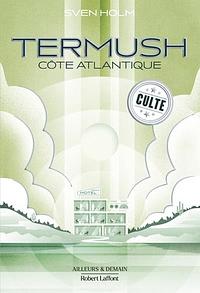Take a photo of a barcode or cover
dark
mysterious
reflective
sad
tense
medium-paced
Plot or Character Driven:
Plot
Strong character development:
Complicated
Loveable characters:
No
Diverse cast of characters:
No
Flaws of characters a main focus:
Yes
A story that is absolutely timeless. There will always be the fortune trying to rise above and pretend like they’re untouchable, and there will always be the less fortune who simply try to survive. Very gripping and proactive for such a short story!
fast-paced
reflective
tense
fast-paced
Plot or Character Driven:
A mix
Strong character development:
No
Loveable characters:
No
Diverse cast of characters:
No
Flaws of characters a main focus:
No
dark
mysterious
reflective
slow-paced
Plot or Character Driven:
A mix
Strong character development:
No
Loveable characters:
No
Diverse cast of characters:
No
Flaws of characters a main focus:
Complicated
dark
slow-paced
Plot or Character Driven:
Character
An intriguing post-apocalyptic novella told in the form of a free flowing stream of consciousness.
Told from an unnamed narrator's perspective, this story focuses on life after nuclear war as a guest at a luxury hotel.
The rich purchased safety and normality, hiding from the destruction in underground shelters, before emerging onto a desolate landscape to take up residence in a beach front retreat named Termush. Management work day and night to cater to their guests, all the while blocking out the barren wasteland that surrounds them. A wasteland that isn't so barren, filled with survivors who wish to encroach upon Termush's oasis.
It's easy to see how this little story was inspired by the fears surrounding the cold war. It's compelling and quietly horrifying. However, it was too short in my opinion. A story within a wider landscape and the end felt abrupt and unsatisfying, hence why I can only give it a 3.
Told from an unnamed narrator's perspective, this story focuses on life after nuclear war as a guest at a luxury hotel.
The rich purchased safety and normality, hiding from the destruction in underground shelters, before emerging onto a desolate landscape to take up residence in a beach front retreat named Termush. Management work day and night to cater to their guests, all the while blocking out the barren wasteland that surrounds them. A wasteland that isn't so barren, filled with survivors who wish to encroach upon Termush's oasis.
It's easy to see how this little story was inspired by the fears surrounding the cold war. It's compelling and quietly horrifying. However, it was too short in my opinion. A story within a wider landscape and the end felt abrupt and unsatisfying, hence why I can only give it a 3.
medium-paced
Strong character development:
No
Loveable characters:
No
Diverse cast of characters:
No
Speedy 105-page read from 1967 Denmark, recently republished with a forward from Jeff Vandermeer (see previous postings). Chapters like journal entries of an individual’s experience within a pre-paid ‘luxury’ hotel shelter after a nuclear war and the slow unraveling of the group’s stability as an increasing number of survivors descend upon the enclave. Holm establishes a pretty strong distance between the subject and reader further objectifying the events. A commentary on the isolation of capitalism or modern, soon-to-be post-industrial western society? Some suggestions about herd mentality in a crisis? There are attempts at describing the landscape which seems to mirror emotional states. ‘Vandermeeerian’ moments occur where language attempts to convey the incomprehensible. In the foreword, it is suggested that the story has staying power because, through it’s craft, it readily associates to the contemporary climate crisis or pandemic conditions. I enjoyed that overlay as I worked my way through the short chapters. Avid readers may find this worth a couple hours of their time. For those with limited time or range of interest, well — let’s just say getting off the interstate for the scenic backroad might not live up to one’s expectations.
dark
mysterious
reflective
tense
medium-paced
Plot or Character Driven:
A mix
Strong character development:
Yes
Loveable characters:
No
Diverse cast of characters:
Yes
Flaws of characters a main focus:
Yes
adventurous
challenging
dark
reflective
medium-paced
Plot or Character Driven:
Character
Strong character development:
Complicated
Loveable characters:
No
Diverse cast of characters:
No
Flaws of characters a main focus:
Yes
Termush offers a unique examination of society through the lens of disaster. It poses the intriguing question: what happens when the world ends but society doesn’t?
This book is somewhat peculiar, leaving you with the feeling that you might have missed something. However, it’s also possible that I did. Despite this, Termush presents an interesting story that critiques capitalism and reflects on humanity. When faced with the end of the world, how do we continue?
Set in a post-nuclear apocalypse, the narrative follows a society of wealthy survivors who have secured their place in an exclusive hotel. The narrator, one of these survivors, observes the group’s dynamics, noting instances where members turn on each other and refuse assistance to those outside who desperately need it. He also reflects on his own feelings throughout the story.
Termush provides a nuanced and thought-provoking take on the post-apocalyptic genre. Although it’s short, it’s deep and ponderous, prompting you to reflect on your own morals and ethics and consider how you might respond in the narrator’s situation. There’s a lot to absorb in this brief book, making it a worthwhile read for anyone interested in sociology or the psychology of people.
Holm is not interested in either capturing the lure of glamor or in satirizing the helplessness that comes with always being served. The narrative offers a psychological view, from an inward consciousness looking outwards. Termush was written in a time before image conquered media and art. A present-day version of this story (or the movie version) would be seen as an opportunity for serving spectacle: a shocking sequence with a scene-by-scene unfolding of “the disaster,” a full account of the various luxuries and lavish grounds available to the resort guests, graphic shots of the sick survivors. Termush defies this contemporary hunger for image. Instead, the narrator documents his discomfort with the way the sick are being hidden and their numbers limited by an agreement reached between the guests and the management. He grapples with his own fears of contamination and records his discussions with the doctor on staff, who feels duty-bound to care for the sick. The narrator is also fixated on the power wielded by the hotel management, who become the de facto authority and often omit to inform guests of important developments, such as the whereabouts of the reconnaissance team dispatched to search for habitable land or the disposal of the dead “visitors.” His concerns are with the dynamics of power, the flow of information and rumor, the undercurrents of fear, the shifts in group solidarity and the moment this tips over into viewing the sick visitors as the enemy.
Full review at The Chicago Review of Books: https://chireviewofbooks.com/2024/01/15/termush/
Full review at The Chicago Review of Books: https://chireviewofbooks.com/2024/01/15/termush/



